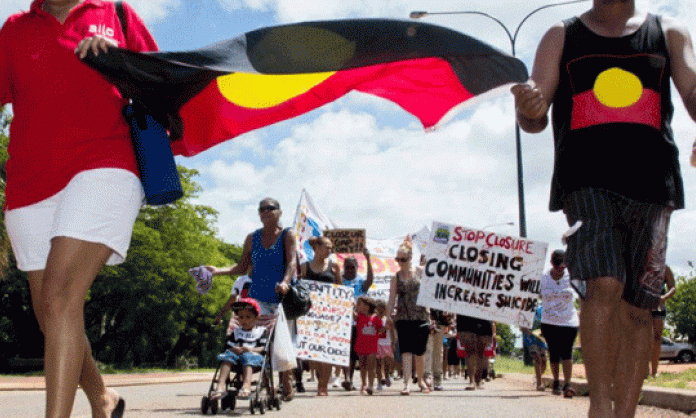The campaign against the Western Australian government’s plans to close remote Aboriginal communities in the state’s north continues.
Aboriginal people and supporters once again rallied in Perth on 23 April to protest the closures. Hundreds gathered in the CBD and marched to Parliament House. Masses of Aboriginal flags were carried, as well as banners bearing “Black Lives Matter” and anti-Liberal slogans.
Addressing the rally, Sydney activist Uncle Albert Hartnett said: “This is a continuation of the genocidal practices of the invaders and what they brought when they colonised this country 227 years ago … To all the brothers and sisters in the north, to the Kimberley mob, to the people in the Pilbara, to the people in the goldfields and the wheat belt – this is a declaration of war.”
Coonana, 170km from Kalgoorlie-Boulder, is a testament to the years of neglect. Several months ago, the community had its power and water shut off by the state government without warning. In a 15 November ABC article, the minister for mining and housing, Bill Marmion, blamed the “anti-social behaviours of residents and visitors” for the poor standard of housing and social problems leading to its demise.
However, pastor Geoffrey Stokes, who is currently involved in the campaign against the closures, said: “I think they’ve been moved out quietly and quickly, the government has come in and taken over.
“The funds for the shop stopped, the water and electricity, and the other thing they took out was the health services, and that’s the most important service that they had out there.”
Similar reports of power and water being shut off without warning have also come from the towns of Yandeyarra, Jigalong and Cotton Creek in the Pilbara.
The Overcoming Indigenous disadvantage, key indicators 2014 report shows that the number of people with access to clean water and functioning sewerage and electricity services is declining. The proportion of Indigenous people living in houses with “adequate” services fell from 83 percent in 2008 to 78 percent in 2012-13.
The government’s current expenditure of $45 million per year was stretched over 270 communities. It is an insulting slap in the face for those who are in desperate need of help. Successive governments have systematically defunded these communities, watched them struggle, and then destroyed them.
Contrast this with the hundreds of billions of dollars mining companies make digging up Aboriginal land and the tens of billions of dollars that the government has reaped in revenues.
Activists, however, are defiant. Hartnett says, “It has come to a time now where the world is starting to recognise the genocide and the apartheid that exists in this country. And we will stand together to beat these barriers down.”




